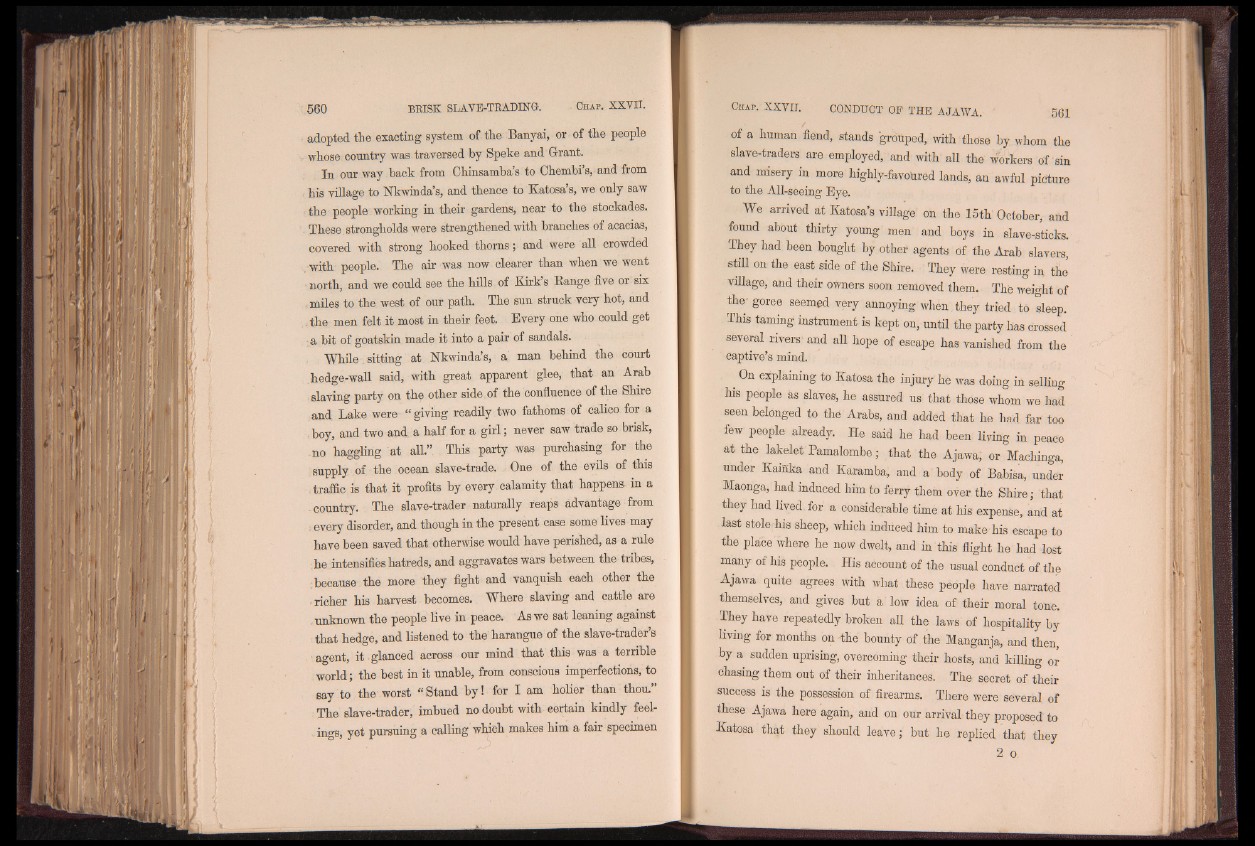
adopted the exacting system of the Banyai, or of the people
- whose country was traversed by Speke and Grant.
In our way hack from Chinsamba’s to Chembi’s, and from
his village to Nk win da’s, and thence to Katosa’s, we only saw
the people working in their gardens, near to the stockades.
These strongholds were strengthened with branches of acacias,
covered with strong hooked thorns j and were all crowded
with people. The air was now clearer than when we went
north, and we could see the hills of Kirk s Range five or six
. miles to the west of our path. The sun struck very hot, and
. the men felt it most in their feet. Every one who could get
a bit of goatskin made it into a pair of sandals.
While sitting at Nkwinda’s, a man behind the court
hedge-wall said, with great apparent glee, that an Arab
slaving party on the other side of the confluence of the Shire
and Lake were “ giving readily two fathoms of calico for a
. boy, and two and a half for a g irl; never saw trade so brisk,
no haggling at all.” This party was purchasing for the
supply of the ocean slave-trade. One of the evils of this
.traffic is that it profits by every calamity that happens- in a
country. The slave-trader naturally reaps advantage from
, every disorder, and though in the present case some lives may
have been saved that otherwise would have perished, as a rule
he intensifies hatreds, and aggravates wars between the tribes,
: because the more they fight and vanquish each other the
-richer his harvest becomes.. Where slaving and cattle are
. unknown the people live in peace, As we sat leaning against
that hedge, and listened to the harangue of the slave-trader’s
agent, it-glanced across our mind that this was a terrible
world; the best in it unable, from conscious imperfections, to
say to the worst “ Stand by! for I am holier than thou.
The slave-trader, imbued no doubt with eertain kindly feelings,
yet pursuing a calling which makes him a fair specimen
of a human fiend, stands grouped, with those by whom the
slave-traders are employed, and with all the workers of sin
and misery m more highly-favoured lands, an awful picture
to the All-seeing Eye.
We arrived at Katosa’s village on the 15th October, and
found about thirty young men and boys in slave-sticks.
They had been bought by other agents of the Arab slavers,
still on the east side of the Shire. They were resting in the’
village, and their owners soon removed them. Thè weight of
the* goree seemed very annoying when they tried to sleep.
This taming instrument is kept on, until the party has crossed
several rivers and all hope of escape has vanished from the
captive’s mind.
_0n M i n i n g to Katosa the injury he was doing in soilin g
his people as slaves, he assured us that those whom we had
seen belonged to the Arabs, and added that he had far too
few people already. He said he had been living in peace
at the lakelet Pamalombe ; that the Ajawa, or Mackinga,
under Kainka and Karamba, and a body of Babisa, under
Maonga, had induced him to ferry them over the Shire ; that
they had lived, for a considerable time at his expense, and at
last stole-his sheep, which induced him to make his escape to
the place where he now dwelt, and in this flight he had lost
many of his people. His account of the usual conduct of the
Ajawa quite agrees with what these people have narrated
themselves, and gives but a low idea of their moral tone.
They have repeatedly broken all the laws of hospitality by
living for months on -the bounty of the Manganja, and then,
by a sudden uprising, overcoming their hosts, and k illin g 0r
chasing them out of their inheritances. The secret of their
success is the possession of firearms. There were several of
these Ajawa here again, and on our arrival they proposed to
Katosa that they should leave ; but he replied that they